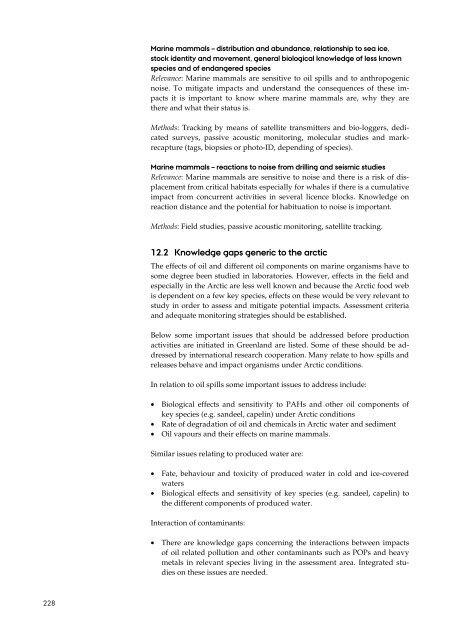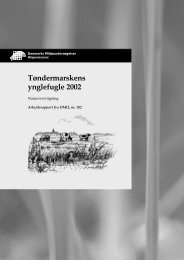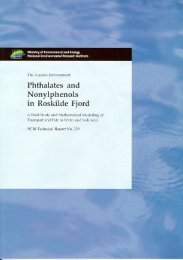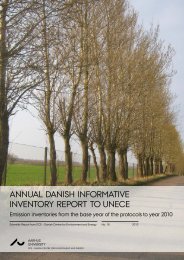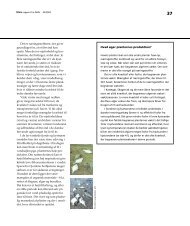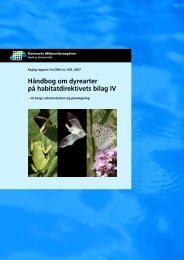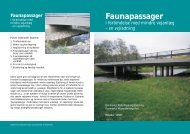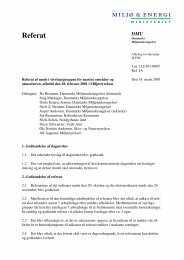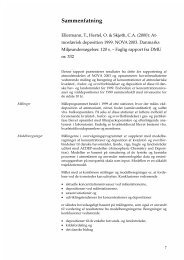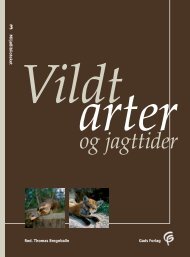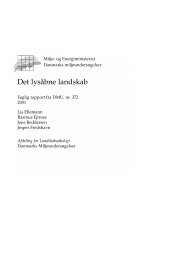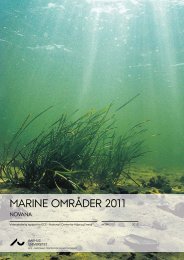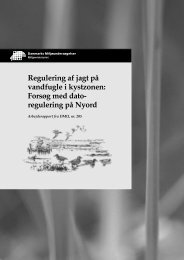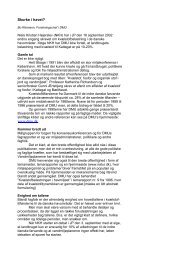The Davis Strait - DCE - Nationalt Center for Miljø og Energi
The Davis Strait - DCE - Nationalt Center for Miljø og Energi
The Davis Strait - DCE - Nationalt Center for Miljø og Energi
Create successful ePaper yourself
Turn your PDF publications into a flip-book with our unique Google optimized e-Paper software.
228<br />
Marine mammals – distribution and abundance, relationship to sea ice,<br />
stock identity and movement, general biol<strong>og</strong>ical knowledge of less known<br />
species and of endangered species<br />
Relevance: Marine mammals are sensitive to oil spills and to anthrop<strong>og</strong>enic<br />
noise. To mitigate impacts and understand the consequences of these impacts<br />
it is important to know where marine mammals are, why they are<br />
there and what their status is.<br />
Methods: Tracking by means of satellite transmitters and bio-l<strong>og</strong>gers, dedicated<br />
surveys, passive acoustic monitoring, molecular studies and markrecapture<br />
(tags, biopsies or photo-ID, depending of species).<br />
Marine mammals – reactions to noise from drilling and seismic studies<br />
Relevance: Marine mammals are sensitive to noise and there is a risk of displacement<br />
from critical habitats especially <strong>for</strong> whales if there is a cumulative<br />
impact from concurrent activities in several licence blocks. Knowledge on<br />
reaction distance and the potential <strong>for</strong> habituation to noise is important.<br />
Methods: Field studies, passive acoustic monitoring, satellite tracking.<br />
12.2 Knowledge gaps generic to the arctic<br />
<strong>The</strong> effects of oil and different oil components on marine organisms have to<br />
some degree been studied in laboratories. However, effects in the field and<br />
especially in the Arctic are less well known and because the Arctic food web<br />
is dependent on a few key species, effects on these would be very relevant to<br />
study in order to assess and mitigate potential impacts. Assessment criteria<br />
and adequate monitoring strategies should be established.<br />
Below some important issues that should be addressed be<strong>for</strong>e production<br />
activities are initiated in Greenland are listed. Some of these should be addressed<br />
by international research cooperation. Many relate to how spills and<br />
releases behave and impact organisms under Arctic conditions.<br />
In relation to oil spills some important issues to address include:<br />
• Biol<strong>og</strong>ical effects and sensitivity to PAHs and other oil components of<br />
key species (e.g. sandeel, capelin) under Arctic conditions<br />
• Rate of degradation of oil and chemicals in Arctic water and sediment<br />
• Oil vapours and their effects on marine mammals.<br />
Similar issues relating to produced water are:<br />
• Fate, behaviour and toxicity of produced water in cold and ice-covered<br />
waters<br />
• Biol<strong>og</strong>ical effects and sensitivity of key species (e.g. sandeel, capelin) to<br />
the different components of produced water.<br />
Interaction of contaminants:<br />
• <strong>The</strong>re are knowledge gaps concerning the interactions between impacts<br />
of oil related pollution and other contaminants such as POPs and heavy<br />
metals in relevant species living in the assessment area. Integrated studies<br />
on these issues are needed.


